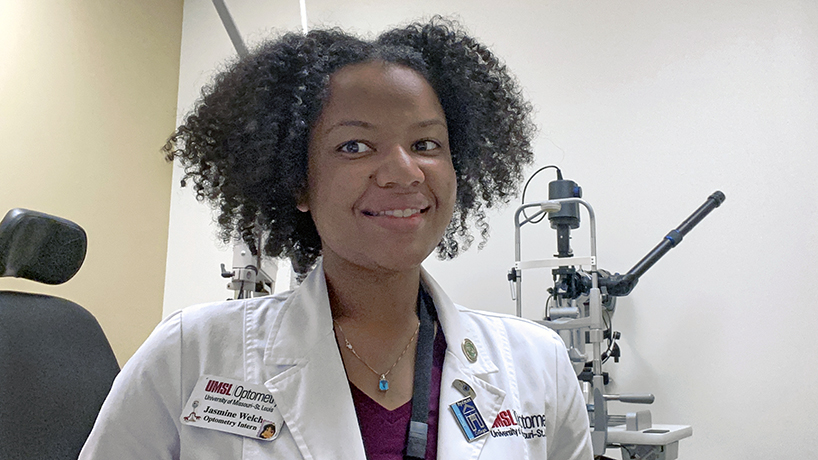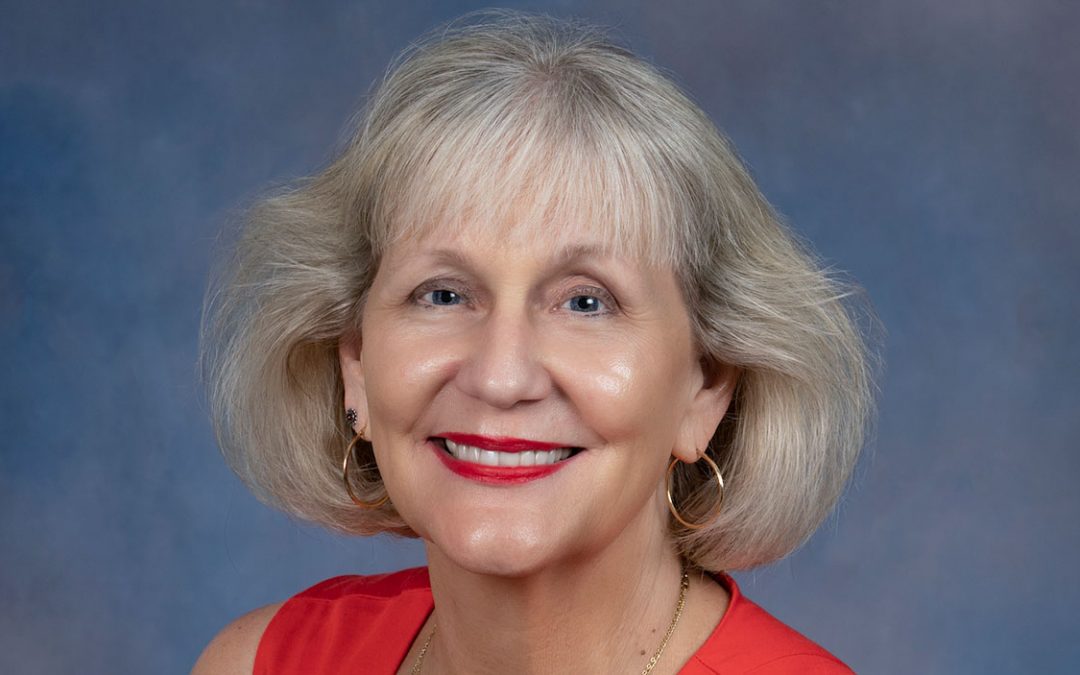
College of Optometry student Jasmine Welch overcame initial challenges to find passion for contact lenses and for outreach efforts. (Photo courtesy of Jasmine Welch)
Getting a scleral contact lens to fit correctly involves fine-tuning many aspects of the large-diameter specialized lens that extends to rest on the white of the eye.
That process is part of what makes them University of Missouri–St. Louis student Jasmine Welch’s favorite.
“It’s a puzzle, trying to match the lens with the eye, as opposed to a soft lens, as you just pop that on, and you’re out the door,” the College of Optometry student said. “It’s a little bit more involved, more hands on, and I enjoy that.”
The unique lenses, Welch explains, can be useful for patients with keratoconus – a condition where the cornea juts out from the eye – with corneal transplants, with irregular astigmatisms that other contacts or glasses don’t fully help or even with corneal wounds that aren’t healing properly.
Adjusting the varied aspects of something fiddly into something beneficial and ultimately healing isn’t just a description of Welch’s favorite lens though. It’s also a metaphor for her process into optometry school and the profession, which was marked by early struggle that’s transformed into triumph and then a desire to give back.
“Every day I wake up like, ‘Oh my goodness, I can’t believe I’ve made it this far,’” Welch said. “It’s easy to say you’re going to do something but to actually do it – it’s really crazy. It’s surreal.”
Welch’s journey to optometry began with her first pair of glasses at age 6 and realizing that leaves weren’t “just green blobs on brown sticks.”
Always interested in the medical professions, she considered nursing and pharmacy, trying out a chemistry major her first year of undergraduate at Spelman College. At the end of her freshman year, Welch switched to biology and started thinking about her yearly eye exam.
“It’s the reason that I’ve gotten this far because vision is so important to education,” she said. “I started shadowing different optometrists, and the patient interaction that you get as an optometrist made me want to pursue this career.”
Welch loaded up on optometry prerequisites and embarked on studying for the Optometry Admissions Test, taking it between her junior and senior years. Not happy with her results, she took it again, then applied to optometry schools.
But Welch didn’t get in.
“I was really disappointed, but now that I look back, I needed that year,” she said, explaining that she’d gotten a job as a lab assistant at Baptist Hospital in Memphis, Tennessee, retook the OAT again and asked for fresh letters of recommendation.
Her next round of applications, Welch applied to seven schools, interviewing at five.
“I was looking more of a, ‘where do I fit,’ as opposed to ‘I just really want to get in,’” she said. “I saw that at UMSL because the class size is so small, they’d never let me fall through the cracks.”
The first semester of optometry school proved to be a rough transition for Welch. She found herself focusing too much on getting a good grade just to have a good grade and would get into her own head during tests.
But things changed when she shifted her mindset.
“It’s kind of like trying to drink from a fire hydrant because of all the knowledge comes at you at once,” Welch said. “In my second semester, I focused more on trying to learn the material. I would always frame everything into ‘How will this help you help your patients?’ as opposed to ‘How will this get you in an A?’”
Discovering favorite subjects also helped, confirming Welch was on the correct path. One was immunology – also her most difficult class – and the other was contact lenses.
Finding a passion for contacts was surprising to Welch because she’d long refused to wear them.
“We had an intro to contact lens course before we started seeing patients, and I was like, ‘This is what I want to do,’” she said. “Turns out it was the brand of contacts that I was wearing that didn’t agree with me. Now I wear them pretty much every day, and I’m actually considering doing a cornea and contact lens residency after graduation.”
Figuring out how to handle school felt great, and Welch wanted to give back to others. She became a member of the American Optometric Student Association, serving as treasurer for a time, and also helped do tours for prospective students as an Optometry Ambassador.
Then she received an email from Assistant Clinical Professor Brittany Wright, coordinator of diversity, equity and inclusion for the College of Optometry, inviting students to participate in an outreach effort. Eyes on Diversity, which Wright and others at UMSL revitalized this summer, aims to bring awareness of optometry as a career option to underrepresented high school students.
It gave Welch an opportunity to share her love of the profession.
“It was really fun,” she said. “We had five or six students. I remember the first day I said, ‘By the end of this, someone here is going to want to be an optometrist.’ Actually, I was wrong, because two of them said they wanted to be optometrists.”
Welch wanted to show the high school students that one could have a circuitous path and still be successful. She also wanted to be visible and demonstrate that there were students of color in optometry school.
This wasn’t Welch’s only efforts along those lines. During the pandemic, Welch reached out to organizers of Black EyeCare Perspective’s The 13% Promise, founded by Dr. Adam Ramsey and Dr. Darryl Glover. The initiative works to change the profession’s makeup until it reflects that of the U.S. by creating opportunities and awareness of optometry as a profession for Black students.
“Only 3% of optometrists are Black,” she said. “If you look at most optometry schools, it’s the same thing. It’s like 2 to 3% Back, but Black people make up 13% of the population. There’s a disconnect between optometry and Black people, and also other minority groups.”
She has shared her perspective and experiences of school with prospective students and also participated in Black Eyecare Prospective PreOptometry Club Signing Day, an NFL-style event where students reveal their future optometry schools, and the members celebrate their accomplishments.
As a fourth-year student completing her year of clinical rotations, Welch approaches the end her time in the College of Optometry but it’s not the end of her outreach efforts. Despite all that she’s accomplished in school, she feels driven to contribute more and continue advocating.
“There’s always room to do more,” Welch said. “…I do have to acknowledge that I have done a lot. But there’s this little voice. It’s like, ‘We could do something else. Yeah, you could talk to someone else. You could reach out to one more person. You can be that person you wanted to see.’”














